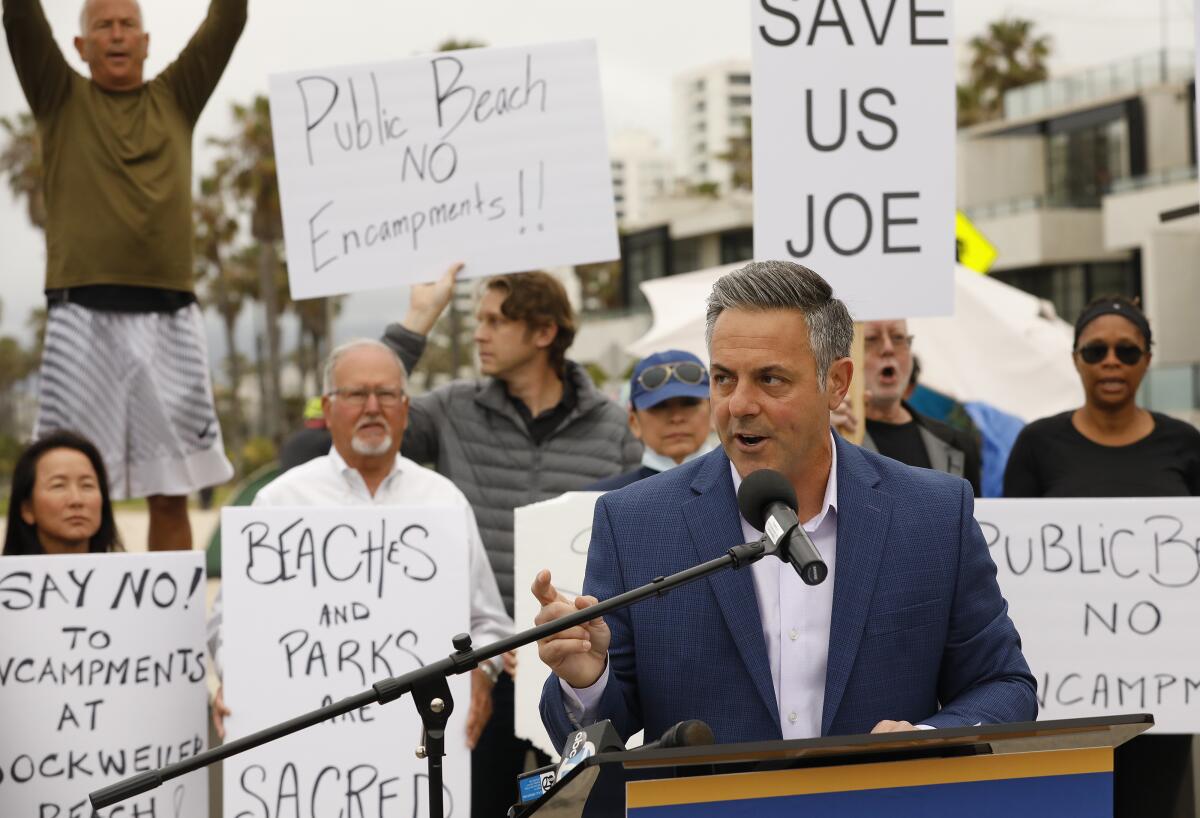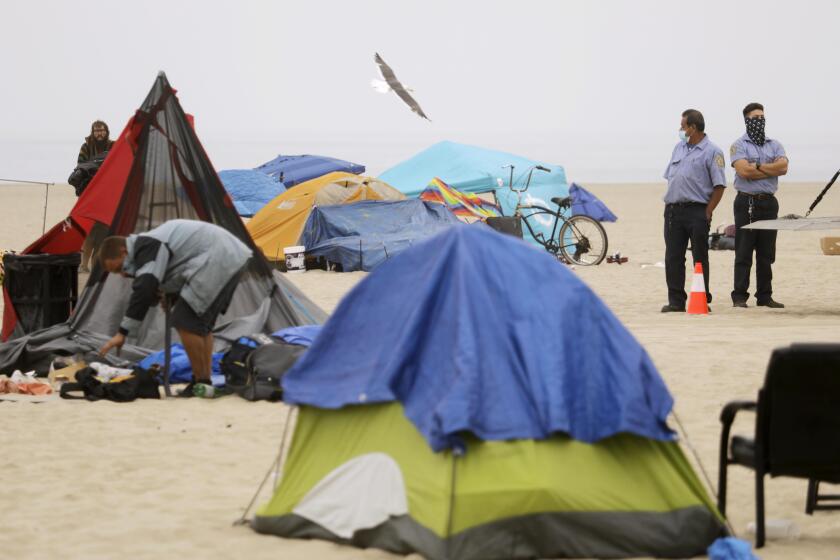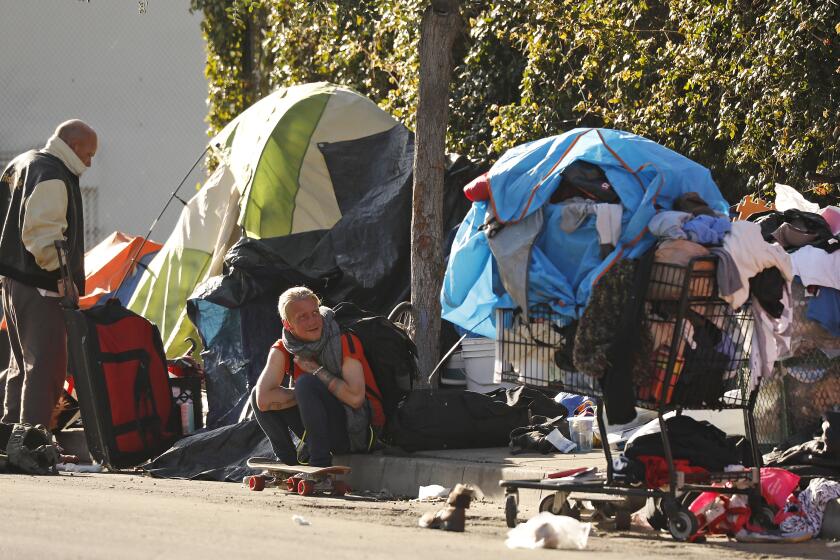Buscaino wants L.A. voters to decide whether to bar homeless encampments in public spaces

Los Angeles City Councilman Joe Buscaino has begun laying the groundwork for a ballot measure that would prohibit people from sleeping or camping on sidewalks and other public spaces if they have turned down offers of shelter or emergency housing.
Buscaino, who is running for mayor, said he intends to ask his colleagues to place his proposal on the June 2022 ballot — one where he also plans to appear as a citywide candidate. He said that if the council declines to act, he would gather the nearly 65,000 voter signatures necessary to qualify the proposal for the ballot.
The proposal offers the latest sign that homelessness will be a central issue in next year’s municipal election, both in the mayor’s race and in other city contests.
Buscaino argued that his ballot proposal, still in the early stages, would help the city respond to a humanitarian crisis more swiftly than it will under the city’s new anti-camping ordinance, which was approved in July and goes into effect on Friday. The ballot measure would provide emergency housing for “everyone living on the streets,” while also prohibiting encampments in all public areas, he said.
A sweeping ordinance outlawing camping around parks, libraries and other facilities was approved last week by the Los Angeles City Council.
“We’ve learned through experience that not everyone goes into shelter if there are no consequences for staying on the street,” Buscaino said. “There need to be rules banning camping citywide.”
The councilman, who represents neighborhoods from Watts to San Pedro, said he has already begun speaking with donors who are “anxious and excited” about the proposal. Contributions are going into his ballot measure committee, Joe Buscaino for a Better L.A.
Still, Buscaino is already facing pushback from some of his colleagues, who have spent the past two months developing their own strategy for delivering services to the unhoused and restoring access to public spaces. “Until I am caused to think otherwise,” said Councilman Mark Ridley-Thomas, “what he is proposing is enforcement with lipstick on it.”
“Enforcement alone, no matter how you dress it up, is never going to be sufficient to address this crisis,” said Ridley-Thomas, who heads the council’s homelessness committee. “What’s needed, and desperately so, is housing and services. And so my comment to Mr. Buscaino would be: Show me the housing, Joe. Show me the housing.”
Councilman Kevin de León, who has been pondering his own run for mayor, also weighed in against Buscaino’s proposal.
“The council is already moving forward on a plan that balances effective outreach, housing, and enforcement,” he said in a statement. “This ballot measure is simply the wrong approach.”
Homelessness has emerged as a front-burner issue in L.A. The city’s unhoused population exceeded 41,000 during the last formal homelessness count, which was conducted before the COVID-19 outbreak.
One recent voter survey, conducted between July 29 and Aug. 5, found that 93% of respondents viewed homelessness as a very serious problem or extremely serious problem.
Another poll, commissioned in June by Buscaino’s mayoral campaign committee, found that 50% of respondents strongly favored the idea of banning camping on sidewalks and inside parks if camping areas with restrooms were offered elsewhere. An additional 30% somewhat supported the idea, the survey found.
Buscaino said he is modeling his efforts, in part, on the city of Austin, Texas, where voters overwhelmingly approved a law in May making it a criminal offense to sit or lie down on a public sidewalk or sleep outdoors in its downtown and in the area around the University of Texas. He also cited efforts underway in Seattle, where civic leaders have attempted to put a package of strategies for addressing homelessness on the ballot, only to face legal setbacks.
In L.A., the new anti-camping ordinance will allow council members to prohibit homeless encampments on sidewalks near schools, parks, daycare centers and other public facilities. However, enforcement cannot take place unless the council has approved a resolution allowing such actions in a particular location.
Once a location has been identified by the council, city crews would need to install signs making clear that the area has been designated for enforcement. Enforcement would not begin for at least 14 days after those signs have gone up.
A federal appeals court upheld an injunction that stops Los Angeles from taking and destroying bulky items used by homeless people on public property.
Council members are still putting together the ordinance’s “street engagement” strategy, which would assign outreach workers to help unhoused people secure housing, shelter and other services in each targeted area. That strategy, envisioned as a seven-step process, is expected to come up for a council vote in two weeks.
Buscaino, who voted for the anti-camping law, nevertheless contends that the process will be too slow and bureaucratic to provide meaningful progress. Meanwhile, the city’s strategy has been denounced by homeless advocates, who say it will saddle people living on the streets with financial penalties that will make it more difficult for them to escape poverty.
Foes of the ordinance also contend that the measure will be confusing, leaving homeless people unclear about where they can sleep outdoors. Buscaino agreed, saying the city needs an ordinance that is easier to understand.
Ridley-Thomas, who recently ruled out a mayoral bid, said he believes Buscaino is only pursuing a ballot measure in hopes of delivering a boost to his own citywide campaign.
Buscaino denied the allegation in an interview.
“We’re doing all we can to solve this issue,” he said.
More to Read
Sign up for Essential California
The most important California stories and recommendations in your inbox every morning.
You may occasionally receive promotional content from the Los Angeles Times.













